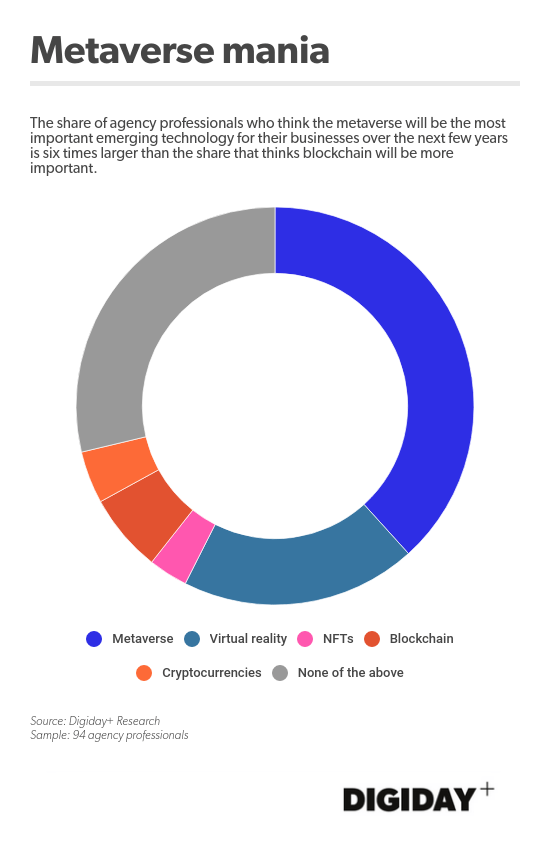Marketing Briefing: Marketers are going all in on metaverse marketing, but is it premature?
In recent months, marketers have seemed to be more and more bullish on the metaverse. Pitches for various metaverse activations — some with in-person extensions — have been consistent as marketers seem to be hoping to garner headlines for simply having brand activations in the metaverse, agency execs told Digiday.
Marketers are always looking to be part of the next big thing, whatever that may be, so experimentation makes sense. That being said, it’s still unclear if the metaverse will actually become that next big thing or be yet another quick fad that marketers were once pouring cash into a la apps like Clubhouse or Peach or technologies like chatbots or AR and VR. (Remember a few years ago agencies were so bullish on VR as the next big thing that they were eating the costs of testing it out for clients?)
Some agency execs question the purpose of metaverse marketing, wondering what problem it solves for marketers as well as the audience. Others say it’s already giving marketers access to audiences they wouldn’t be able to interact with without it and that it’s worth continuing to test out various activations even if the audience isn’t there yet.
“The fact that nobody can agree on what the metaverse actually is is a good sign that the pressure to be there is more about FOMO than about common sense,” said Mark Pytlik, CEO, Stink Studios, when asked about the future of metaverse marketing. “Marketers need an audience to market to, but the ‘metaverse’ is so fractured and so platform-dependent that there’s no critical mass of consumers in any one place to really merit serious long-term investment from most brands.”
Pytlik continued to say that some of the metaverse activations feel like a bid for “quick PR” but even that has “diminishing returns.” “So much of it feels like pure hype and PR and speculation,” he said.
The possibility of PR or being the first brand to do something can sway some marketers to experiment with trends and spend on apps that make little sense in actuality for their brands. Take the metaverse — it’s still unclear if the audience will grow to make it into a marketing budget staple.
To get contextualize the popularity of these technologies, Sarah Stringer, evp and head of US media partnerships at dentsu, turns to Google Trends, which provides public data on what terms users are searching for.
As examples, she said, VR peaked in interest in Dec. 2016, blockchain a year later, e-sports in 2019 and metaverse at the end of 2021. Even if the Google Trend data shows a downtrend, marketing efforts for the metaverse still seem to be on an upswing as brands continue to pitch new efforts.
“All these technologies and concepts are building to bigger trends over time, however interest wanes when scale and audience don’t follow,” Stringer said. “We see interest remerge when opportunities evolve and the technology becomes more scaled and accessible. Metaverse became a hot buzzword, which …read more
Source:: Digiday





